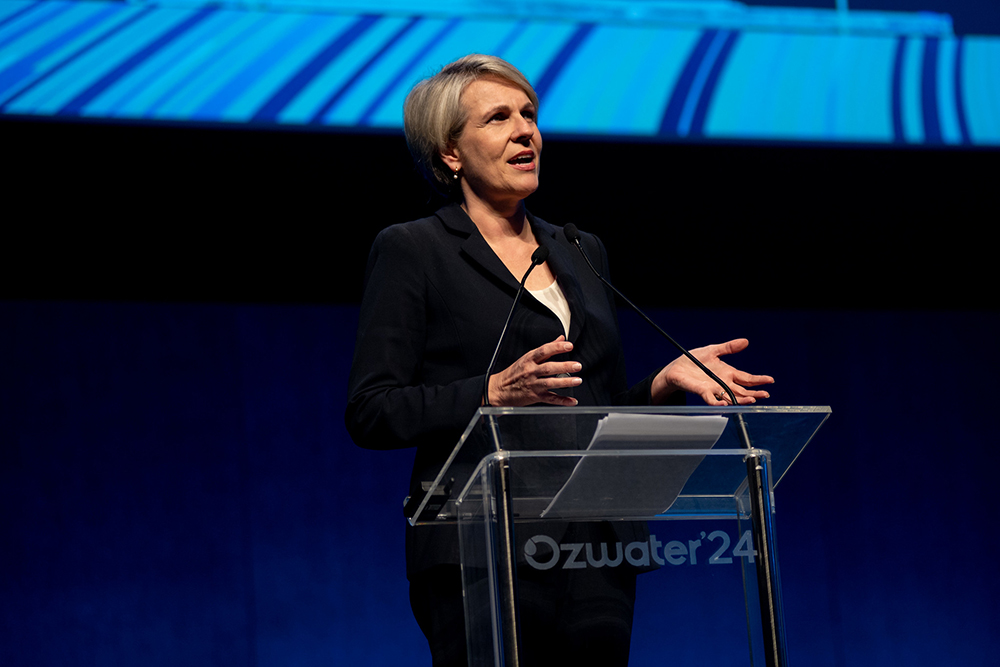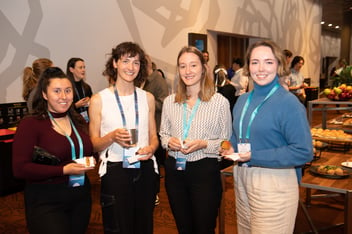Commitment, hope and action take centre stage at Ozwater’24

On the final day of Ozwater’24, delegates were treated to three inspiring keynote speakers, including Minister for the Environment and Water Tanya Plibersek, para-surfing champion and bestselling author Sam Bloom, and internationally recognised water resource management expert Kalanithy Vairavamoorthy.
Discussing plans for national water management, Plibersek said the Department of Climate Change, Energy, Environment and Water is currently working on the new National Water Agreement, a commitment to sustainable water action across Australia.
“It's been 20 years since the last National Water Agreement was struck with states and territories. So much has changed since 2004. Notably, we are now enduring the shocks of climate change,” she said.
“One thing that has changed for the better is that we're finally beginning to properly take account of First Nations water knowledge, needs and priorities in the way that we design our water systems.
“We now better understand the connection between good water quality and livability, as well as physical and mental health.”
The policy direction of the National Water Agreement seeks to commit to one overarching necessity, Plibersek said: “For us, the message is clear. We need to do much better in this contested space of water management”.
“[We need to do better] as the effects of climate change intensify, as there are increasing demands on water resources to support a wider variety of needs, and as we move into an era when renewable energy and circularity become vital to our economy.”
Plibersek commended water professionals around Australia for their commitment to continually do better for the communities that they serve.
“You are all at the coalface of making these decisions. You manage the water services that Australians rely on and you play a key role in securing our water future,” she said.
“You've got the ideas and the expertise that can better equip us to manage the impacts of climate change and the increased occurrence of extreme weather events.
“Given that we live in the driest inhabited continent on earth, we could and should be a global leaders in water recycling. The National Water Agreement is the opportunity at a national level to help drive that decision-making that we need to engage in. And also to support better public awareness of water sustainability.”
Keeping hope
Generously sharing her journey through rehabilitation, healing and hope following a devastating spinal injury, Sam Bloom had a key message for delegates around the importance of perspective.
After falling from a balcony while on a family trip to Thailand, Bloom’s life – which until then had been filled with freedom, joy and adventure – was turned upside down when she was told she would never walk again.
“Filled with shame and anger, I shut myself off from the world. I didn't want to see any of my friends. They now represented the life I had lost. I was a prisoner in my own body, three quarters of which was all but lifeless,” Bloom said.
“In those days, the constant pain and hopelessness was overwhelming.”
Then along came Penguin – a scruffy magpie chick that Bloom’s family adopted not long after the accident. The remarkable story of healing, which is the inspiration of Bloom’s book, Sam Bloom: Heartache and Birdsong, has now been adapted into a major motion picture.
“We were more than free food and a bed, Penguin was an integral part of our family life. She certainly knew how to make herself at home. Penguin’s ability to bring happiness to each of our shadowed lives is something I'll always be thankful for,” Bloom said.
“Penguin reminded me on a daily basis that we are all part of nature and indeed connected with nature.”
Following initial rehabilitation, Bloom went on to learn how to kayak, was selected to represent Australia on the national para-canoe team, and is now also a two-time world para-surfing champion.
“While I love the benefits and excitement of league competition, the truth is that winning races and medals was never my new goal. I just wanted to get back out in the water. I just wanted to feel like my old self again before my accident,” she said.
“Some days are incredibly hard for me. Even on my good days, I still hate what's happened to me and the devastating impact my injuries have had on my family.
“But I've learned the hard way that there’s something that can affect anyone that’s even more debilitating than spinal injury, and that is self pity.
“When faced with adversity, sitting around, feeling sorry for ourselves will not make us feel better. It will not make us stronger. It will not will not help us win our personal battle with the darkness. I learned to find new things to love and new ways to live.”
Accelerating action
Last but not least, Kalanithy Vairavamoorthy addressed delegates with key insights into the international water sector, and why accelerating action is crucial to addressing the Sustainable Development Goals.
“It’s estimated that at any given time during day and night, an average of 750,000 people are airborne, flying in a plane at an altitude of 38,000 feet above the earth’s surface,” Vairavamoorthy said.
“All these people are provided with safe drinking water, they all have access to adequate sanitation and their wastes are safely managed. It's amazing that, in the 21st century, humankind is capable of permanently maintaining the population of a large town of 750,000 people, 11kms in the sky.
“What's even more amazing, or disgraceful, is that in the same century we have not yet managed to provide safe water and sanitation to our fellow human beings on the ground. And this is not due to a lack of trying.”
Vairavamoorthy said the UN SDG Summit in 2023 was the first opportunity in almost a generation to bring together the global water community, and highlighted the importance of strong leadership moving forward, as well as the need to continue to elevate the voice of youth for action.
“It was really an important event. The conference brought together over 8000 delegates from around the world, including governments, NGOs, academia, multilateral agencies and the private sector,” he said.
“And during this process, we saw around 840 commitments for water action that together form what we now call the Water Action Agenda, which is all about accelerated action to deliver on the SDGs.”
Vairavamoorthy said a strong feature of the UN summit was the recognition of the need for game changing solutions in order to accelerate action.
“Our sector is going through a serious transition, where we're moving to more off-grid circular approaches, where we're using water multiple times and where we're trying to recover value from our waste stream,” he said.
“And this transition really requires a level of leadership and innovation that's unprecedented in our history. A big positive of the summit was the strong active participation of young people, including the AWA Young Water Professional of the Year for 2023, Chelsea Hayward.
“The sector is going through a major transition and it's the young that need to spearhead it. And given that responsibility, it's important that the young are in the room when the key discussions about the water agenda are occurring.”



